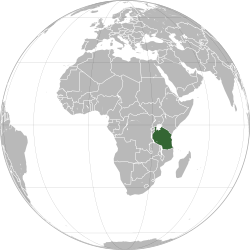Tanganyika (/ˌtæŋɡənˈjiːkə/) was a sovereign state, comprising the mainland part of present-day Tanzania, that existed from 1961 until 1964. It first gained independence from the United Kingdom on 9 December 1961 as a Commonwealth realm[1] headed by Queen Elizabeth II before becoming a republic within the Commonwealth of Nations a year later. After signing the Articles of Union on 22 April 1964 and passing an Act of Union on 25 April, Tanganyika officially joined with the People's Republic of Zanzibar to form the United Republic of Tanganyika and Zanzibar on Union Day, 26 April 1964.[2] The new state changed its name to the United Republic of Tanzania within a year.[3]
Tanganyika (1961–1962) Republic of Tanganyika (1962–1964) Jamhuri ya Tanganyika (Swahili) | |||||||||
|---|---|---|---|---|---|---|---|---|---|
| 1961–1964 | |||||||||
 | |||||||||
| Capital | Dar es Salaam | ||||||||
| Common languages | |||||||||
| Demonym(s) | Tanganyikan | ||||||||
| Government | Unitary dominant-party parliamentary monarchy (1961–1962) Unitary dominant-party assembly-independent republic (1962–1964) | ||||||||
| Head of State | |||||||||
• 1961–1962 | Elizabeth II (Monarch) | ||||||||
• 1962–1964 | Julius Nyerere (President) | ||||||||
| Governor-General | |||||||||
• 1961–1962 | Richard Turnbull | ||||||||
| Prime Minister | |||||||||
• 1961–1962 | Julius Nyerere (first) | ||||||||
• 1962 | Rashidi Kawawa (Last) | ||||||||
| History | |||||||||
• Independence from British Empire | 9 December 1961 | ||||||||
• Republic | 9 December 1962 | ||||||||
• Union with Zanzibar | 26 April 1964 | ||||||||
| Area | |||||||||
• Total | 944,842 km2 (364,806 sq mi) | ||||||||
| Currency | East African shilling | ||||||||
| |||||||||
| Today part of | Tanzania | ||||||||

History
Tanganyika originally consisted of the Tanganyika Territory—the British share of German East Africa—which the British took under a League of Nations mandate in 1922, and which was later transformed into a United Nations Trust Territory after World War II. The next largest share of German East Africa was taken into Belgian trusteeship, eventually becoming present-day Burundi and Rwanda.
The Tanganyika Independence Act 1961 transformed the United Nations trust territory into the independent sovereign state of Tanganyika, with Elizabeth II as Queen of Tanganyika. The monarch's constitutional roles were mostly exercised by the Governor-General of Tanganyika.
Tanganyika adopted a new constitution in 1962 that abolished the monarchy, and the National Assembly (the majority of whom were members of the Tanganyika African National Union Party) thoroughly revised the new constitution to favour a strong executive branch of government, namely a president.[3] Tanganyika then became a republic within the Commonwealth of Nations, with Julius Nyerere as the President of Tanganyika. After the Union of Zanzibar and Tanganyika, an interim constitution adapted from the 1962 Constitution became the governing document. Although meant to be temporary, the constitutions remained effective until 1977.[3]
The unification of Tanganyika and Zanzibar in 1964 followed Nyerere's principle of Ujamaa which entailed a strong "territorial nationalism."[4]



